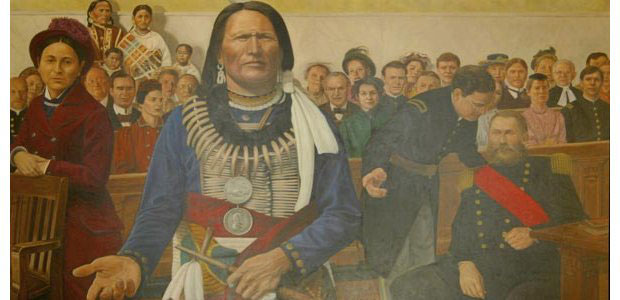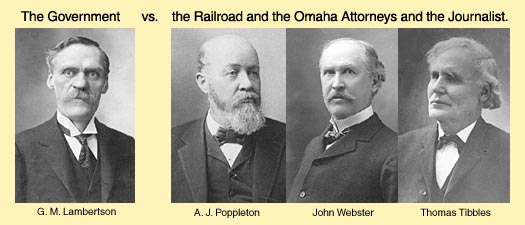"United States ex ret. Standing Bear vs. George Crook, a Brigadier General of the Army of the U.S. Before Elmer S. Dundy, U.S. District Judge for Nebraska. Habeas Corpus."
Back in 1875 Nebraska was a brand new state. Indian tribes were constantly being moved by the government for years, they were told that they had to move over 500 miles to what is now Oklahoma. The government had promised you would find food, shelter and land after you had traveled for several months. But they came to only find hot dry windy conditions and no land had been set aside for them. This was the Ponca's famous journey known as the "Trail of Tears." The tribe was not happy with their conditions and nearly a third of their population had died since their arrival. In January of 1879 Chief Standing Bear's son Bear Shield had died, and Standing Bear was very angered. He then traveled back to Nebraska territory to bury his son on the Omaha reservation. Standing Bear and his followers had left without permission from the national government, and were arrested and were to be returned to Indian territory. General Crook of Omaha had heard of the arrest of the Indians and under his orders they were redirected to Fort Omaha, being held prior to their return to Indian territory. Colonel John H. King then reported the weak conditions of the horses that were suppose to take the Indians back to territory were unable to make the journey at the time. This then came to the attention of the assistant editor of the Omaha Daily Herald, Thomas Henry Tibbles. He sympathized with the Indians and was an ardent crusader. While being watched at the Fort Tibbles enlisted support for the Ponca's cause. He published an interview between Standing Bear and Crook to eastern newspapers then published one in the Omaha paper. Tibbles then sent the following to the Secretary of Interior: "Therefore in spite of my double night tasks for the Herald, I stole my forenoons from sleep to spend them in a law library. I had to devise a case and a method which could release these abused Poncas — and then could recast our nation's whole Indian Policy." Tibbles then roughed out a court case due to the 14th amendment and him and his friend lawyer John L. Webster to represent the Chief without fee. The two attorneys petitioned Judge Elmer for a writ of habeas corpus to compel Crook to justify his arrest of the Ponca. Dundy, then opposed both parties to be before him.
Back in 1875 Nebraska was a brand new state. Indian tribes were constantly being moved by the government for years, they were told that they had to move over 500 miles to what is now Oklahoma. The government had promised you would find food, shelter and land after you had traveled for several months. But they came to only find hot dry windy conditions and no land had been set aside for them. This was the Ponca's famous journey known as the "Trail of Tears." The tribe was not happy with their conditions and nearly a third of their population had died since their arrival. In January of 1879 Chief Standing Bear's son Bear Shield had died, and Standing Bear was very angered. He then traveled back to Nebraska territory to bury his son on the Omaha reservation. Standing Bear and his followers had left without permission from the national government, and were arrested and were to be returned to Indian territory. General Crook of Omaha had heard of the arrest of the Indians and under his orders they were redirected to Fort Omaha, being held prior to their return to Indian territory. Colonel John H. King then reported the weak conditions of the horses that were suppose to take the Indians back to territory were unable to make the journey at the time. This then came to the attention of the assistant editor of the Omaha Daily Herald, Thomas Henry Tibbles. He sympathized with the Indians and was an ardent crusader. While being watched at the Fort Tibbles enlisted support for the Ponca's cause. He published an interview between Standing Bear and Crook to eastern newspapers then published one in the Omaha paper. Tibbles then sent the following to the Secretary of Interior: "Therefore in spite of my double night tasks for the Herald, I stole my forenoons from sleep to spend them in a law library. I had to devise a case and a method which could release these abused Poncas — and then could recast our nation's whole Indian Policy." Tibbles then roughed out a court case due to the 14th amendment and him and his friend lawyer John L. Webster to represent the Chief without fee. The two attorneys petitioned Judge Elmer for a writ of habeas corpus to compel Crook to justify his arrest of the Ponca. Dundy, then opposed both parties to be before him.


